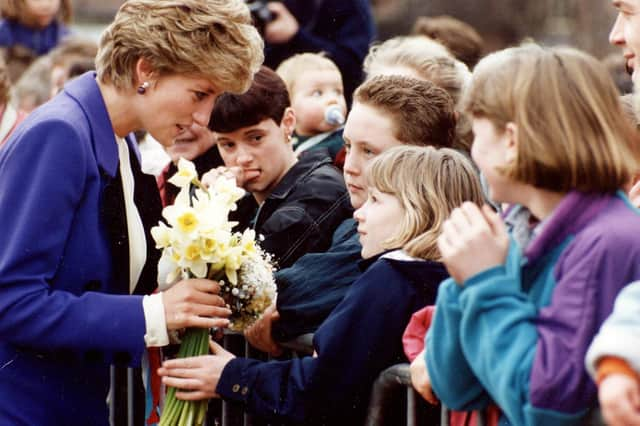How Princess Diana’s funeral was full of raw emotion with the whole nation grieving - Andrew Vine


Disbelief that she was dead aged only 36, leaving two distraught young sons behind, hung in the air as the mourners filed in, many having needed police escorts to get them through the crowds jamming the streets of London.
Television cameras were prohibited from filming the royal family during the service, so the 32 million people in Britain – and billions more around the world – who watched the funeral never saw their reactions.
Advertisement
Hide AdAdvertisement
Hide AdBut from my seat, reporting the funeral for this newspaper, I could see the grief etched on their faces, how the Queen bowed her head and wept and the agony of Prince Charles. And above all, the tears coursing down the faces of William and Harry, which broke the hearts of all who witnessed them.
The grief of the senior Royals, including the Duke of Edinburgh and the Queen Mother, put the lie to the perception amongst sections of the public that they had never cared about Diana.
The rawness of the emotion that filled the abbey sent shivers down the spines of everyone there, especially when a wave of applause swept in from the vast crowds outside on hearing Diana’s brother, Earl Spencer, deliver his incendiary eulogy in which he rebuked the Royals for their treatment of his sister.
Memories of that unforgettable day will seem very vivid tomorrow, the 25th anniversary of Diana’s death. For me, as for many others, the moment when we heard she had died after a car crash in a Paris road tunnel was the equivalent of an earlier generation hearing about the assassination of John F Kennedy in 1963. We remember precisely where we were and what we were doing.
Advertisement
Hide AdAdvertisement
Hide AdA swirl of emotions – disbelief, incomprehension and then anger – swept the country, followed by a mass outpouring of grief.
A quarter of a century on, the people weeping in the streets and the anguished cries that greeted the passage of her funeral procession have passed into history, but emotions still swirl around Diana. The sense that her short, ultimately tragic life was made far worse than it should have been by outside forces which manipulated her has, if anything, grown more intense.
Some of this has been fed by absurd conspiracy theories surrounding her death, which stubbornly refuse to accept the prosaic truth of what happened – that it was the result of an unfit driver and she was not wearing a seatbelt, which may have saved her life.
Fictional portrayals of Diana in films and Netflix’s The Crown have also reinforced the public’s fascination, feeding speculation about what course her life would have taken had it not been for that August night in Paris.
Advertisement
Hide AdAdvertisement
Hide AdBut beyond the dramatisations and speculation, the anniversary is a reminder that Diana continues to exert a massive influence on the Royal family.
The rift between Harry and his family is, at least in part, due to his belief that his mother never received the emotional support she needed. That viewpoint seems certain to be central to his forthcoming autobiography, which
when published might make any reconciliation with his father and brother all the harder.
Last week, as the anniversary approached, Harry told an audience in the US that he wanted to “share the spirit” of Diana with his own children, surely an indication that memories of the mother he knew all too briefly remain precious beyond words to him.
Advertisement
Hide AdAdvertisement
Hide AdDiana’s continuing influence on William, too, is plain. His championing of causes such as mental health in the young and relaxed, informal manner with those he meets closely reflect the emotionally-engaged style which became her trademark. But then, 25 years on, her influence on the way all the senior Royals go about their duties is profound and may be Diana’s most lasting legacy for an institution that she found forbidding in its stiffness and formality.
All the senior Royals appear to have acknowledged she changed how the monarchy works, even the Queen, whose addresses to the country in recent years have grown increasingly personal and revealing of her character.
And maybe that is not surprising, given that in the days after Diana’s death, with public disapproval of the Royals peaking, the Queen broadcast to the nation to make clear that she and the rest of the family were devastated. She read the mood of the nation perfectly. For years, it was uncertain what Diana’s lasting impact would be on the Royal family, with the institution clearly concerned that public opinion would turn against it. Happily, that has not happened as this summer’s Platinum Jubilee made abundantly clear. Diana’s influence has turned out to be a force for good, which makes her loss all the more tragic.